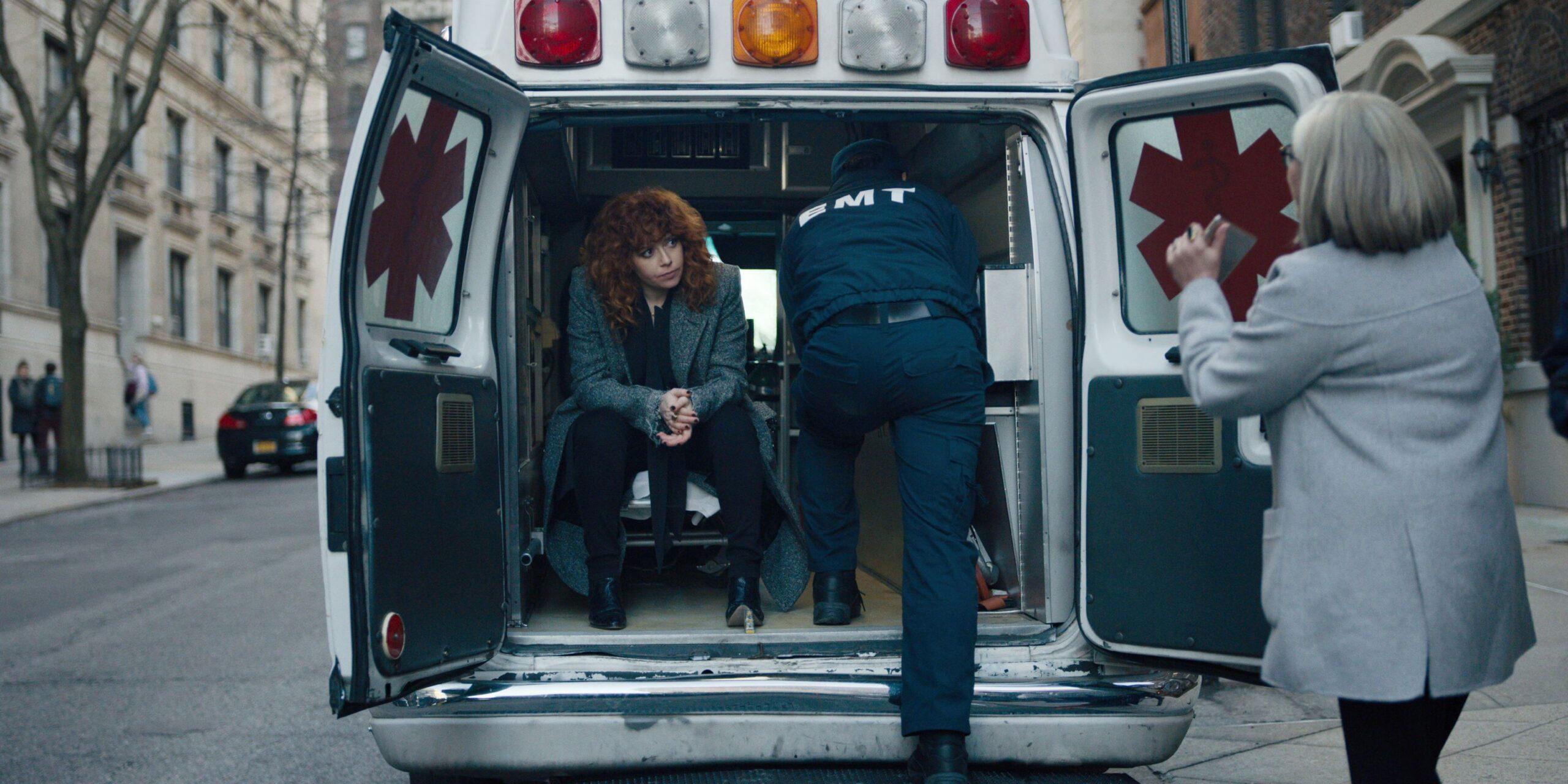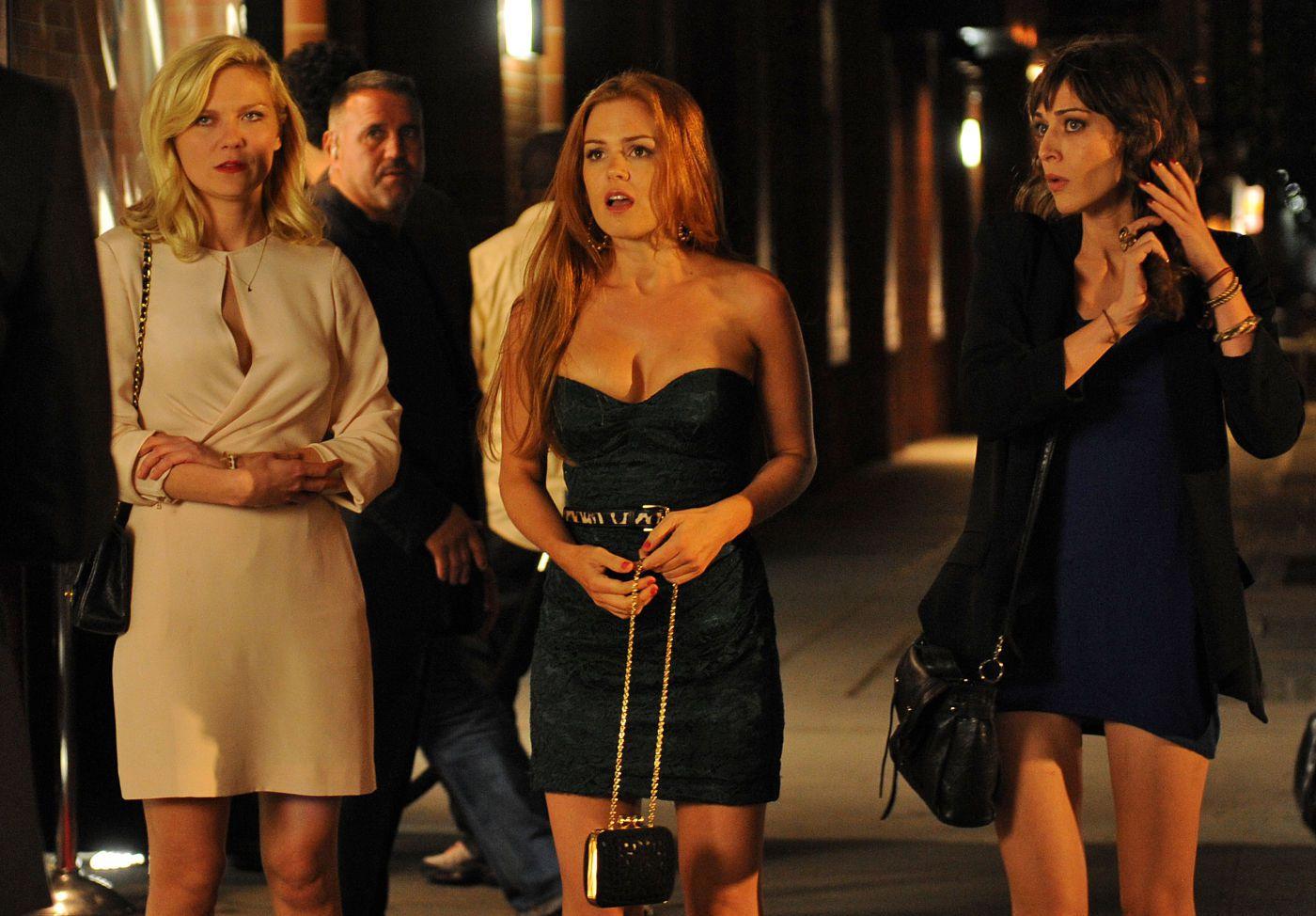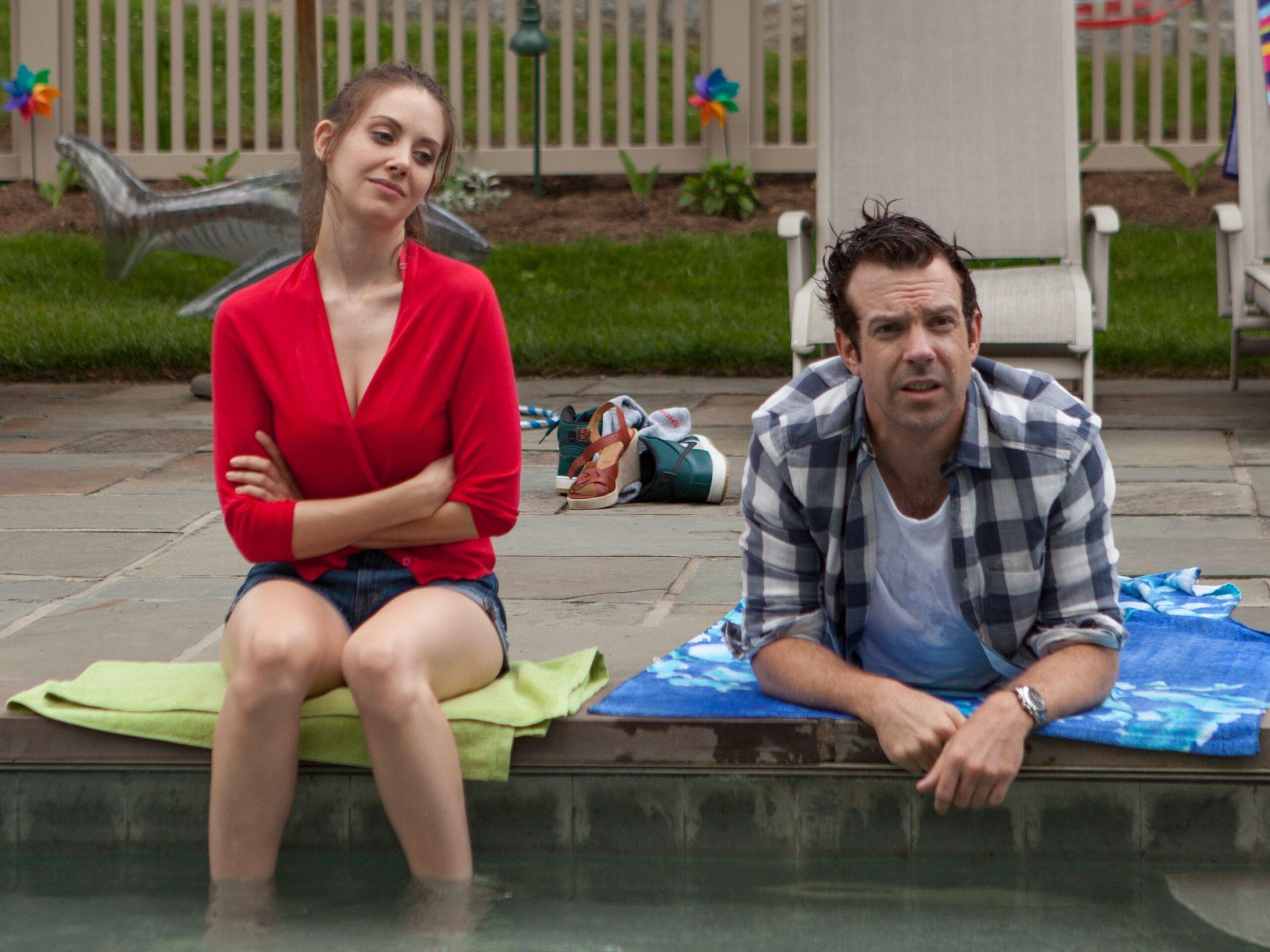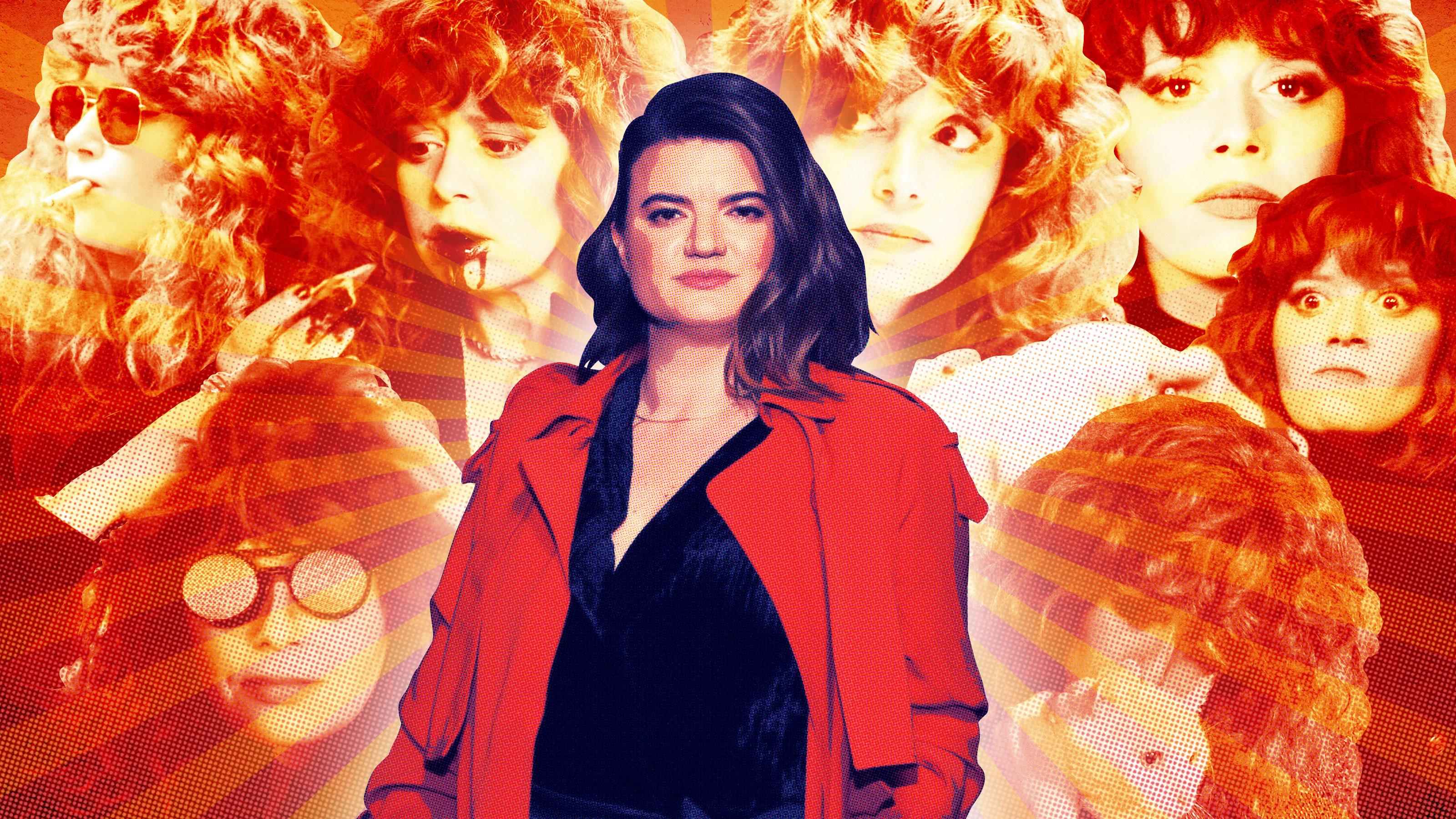Leslye Headland Doesn’t Mind Repeating Herself
The writer-director of ‘Bachelorette’ and ‘Sleeping With Other People’ returns to her preferred subject—brutally honest, mostly-in-crisis women—with Netflix’s ‘Russian Doll.’ It’s the best TV series of the year so far.
Leslye Headland is pretending to be hit by a car. She strides from one end of the room to the other in the South Williamsburg coworking cubicle where we’ve met, holding her arm out to stop invisible traffic. She leans on top of an imaginary hood to demonstrate how Natasha Lyonne’s stunt double looked as she performed a stunt as Nadia Vulvokov, the protagonist of the new Netflix show Russian Doll, who—spoiler alert, although it’s also the basic premise of the show—dies after walking into a taxi’s path in the show’s opening minutes. On the show, it is a jarring leap from a party night into violence and oblivion.
Headland’s imitation is not quite as convincing.
Leslye Headland is talented at many things, but her impression of enduring vehicular manslaughter is, to be blunt, not Emmy-caliber. I don’t feel bad relaying this, because Headland is, above all else, a champion of brutal honesty. Anyway, I hadn’t come to watch her pantomime. Headland’s a storyteller known for psychologically ruthless comedy, not pratfalls: Her debut film, 2012’s Bachelorette, is an emerging cult classic; she has been gaining prominence as an in-demand television director for years; and Russian Doll, an intricate puzzle box of a show she cocreated with Lyonne and Amy Poehler, is the first great TV series of 2019. “Natasha describes it as existential adventure show,” Headland told me. It is that. It is also funny, sad, and cohesive and assured in a way that first seasons of television rarely are.
Lyonne’s Nadia is a wisecracking, hard-living gaming programmer who gets tangled in her own mortal coil. On the night of her 36th birthday, after leaving a party held in her honor, she dies, only to immediately find herself back at the party, staring into a bathroom mirror. She dies again and again, each time returning to the same night and same bathroom. The universe of Russian Doll has the trappings of a cosmic video game that asks, in Headland’s words, “What if you got stuck in your life?”
The “wiseass in a funny but existentially distressing time loop, living the same day over and over” premise is reminiscent of a beloved Bill Murray film, and it’s both tempting and deeply unfair to see this project as a boho Groundhog Day. Unlike Murray’s put-upon weatherman, Nadia can’t escape her cycle by finding true love. Her predicament is best described as a bug in the cosmic programming, something that needs to be unraveled rather than simply escaped. “All right,” Nadia tells her friend Lizzy, a wry, mastiff-loving artist played by Rebecca Henderson (who is also Headland’s wife) in an early scene. “Let’s make some choices.” Headland sees the questions the show asks as examinations of the idea of choice. “Are you actually as in control as you think you are? What happens when you’re forced to take a look at the inner workings of your psyche and how it has shaped the person that you are?” Headland said. “It’s not that she needs to outwit the powers that be, like in Groundhog Day. It’s about the source of the choices that you made, that [in turn] made the life that you have.” Crucially, Nadia is not in her situation alone, as the series progresses she gains a non-romantic partner, Alan (Charlie Barnett), who is also caught in a space-time knot; they need each other to understand themselves and their paths forward.
Russian Doll is a precious thing in 2019: a show that understands how to use the streaming format to maximum effect, with none of the shaggy-dog storytelling that often creeps into digital-first shows. Each episode is done in under 30 minutes, and the recursive narrative makes a binge feel like falling down a rabbit hole and into a field of magic mushrooms. It’s not episodic as much as it is cumulative, and its open-ended finale is cathartic but decidedly not a cliff-hanger. The original pitch to Netflix was a three-season series, with each chapter capable of functioning as a stand-alone entity. “It was always supposed to feel closed at the end of Season 1,” Headland said. “Now we’re thinking more that maybe it should relate more to Season 1 than we had originally thought.” It’s not clear, then, whether any of the characters from the first installment will reappear if a second is green-lit. The show’s future is wide open.

One immutable thing about Russian Doll: Future seasons are also meant to take place in New York, no matter what changes about the story. Headland has fixated on the city as the setting for nearly all her stories. She was raised in Maryland, but the 38-year-old has spent nearly all of her adult life as a New Yorker, arriving in the late ’90s to attend NYU. Like Lyonne, it’s hard to imagine her anywhere else. Headland and Lyonne share enough commonalities—low voices, lower tolerance for bullshit—that people have frequently assumed that the acerbic pair are old friends, although they met on the set of Sleeping With Other People, the zippy, Ephron-core 2015 romantic comedy Headland wrote and directed. (Lyonne appeared as the straight-talking best friend to Alison Brie’s Lainey, who is romantically obsessed with an unavailable man.) “Everyone was already putting us together as a similar type of woman or type of artist. When we met each other, we felt this synergy of, ‘Oh my gosh, yeah, everybody was right,’” Headland said. After wrapping the film, Lyonne shot a pilot with Poehler that was not picked up, and the two women began discussing a new project. Lyonne then talked to Headland about the three working on something together.
While Headland has directed a variety of television shows, Russian Doll is the first show she has cocreated to be picked up to series; while she made her name in film, she started her writing career in theater. After graduating from Tisch’s directing program, she gained attention for a play cycle called Seven Deadly Sins, with each installment thematically centered on a sin. Her intention with her playwriting was not to emerge as a humorous voice, and she still does not see herself as primarily a comedy person. But when her first play opened in 2004, she started to realize that her writing style had unintended effects on the audience. “I thought I had written this beautiful art and emotional piece,” she said, noting that she was shocked when the audience responded to her dialogue by cracking up. “For the next 60 minutes, they were just laughing uncontrollably and I was beside myself in tears.”
Bachelorette, the play Headland wrote about gluttony, debuted in 2010 and ginned up enough attention as an off-Broadway hit to nab her a spot in the writers’ room of the FX show Terriers, which would run for one critically acclaimed season. Headland worked on a screenplay adaptation of Bachelorette, which ended up on the prestigious Black List but also received frequent comments about how it would never get made. “Because it was before Bridesmaids, everyone was like, ‘No one’s ever going to make this movie. Good luck,’” Headland said. “Bridesmaids got green-lit, and, all of a sudden, all of these places that had been saying, ‘We don’t want an all-female comedy,” were like, “Give us an all-female comedy.’”
“I was like, ‘Great, here’s one. It’s about addiction.’”
In the film Bachelorette, Regan (Kirsten Dunst), Gena (Lizzy Caplan), and Katie (Isla Fisher) are shocked when the odd woman out in their high school group of friends, kindhearted Becky (Rebel Wilson), announces that she is engaged to a wealthy, handsome man. Once upon a time, Becky was the resident fat friend in the group of skinny “bitch faces,” and she generously asks her old pals to join her bridal party despite … their personalities. They pay her back by ripping her wedding dress the night before the wedding. The majority of the film follows the women as they zip around Manhattan trying to repair the damage, hoovering up heroic quantities of cocaine and offending nearly everyone they encounter in the process. During the film’s climax, Katie overdoses and nearly dies. She is saved because Regan, who has bulimia, is an expert in all things puke.

Though they share broad thematic similarities, each centering on women in a wedding party whose weaknesses and insecurities are thrown into sharp relief because of their friend’s upcoming nuptials, Bridesmaids and Bachelorette are in different tonal galaxies. Bridesmaids is a generous comedy with an Apatow-inflected sensibility, where everyone hugs and lessons are learned. Headland softened her play while adapting it—the original is even darker!—but Bachelorette is still a comedy of spectacularly bad manners. (This commitment to wickedness wasn’t always seen as a plus. The Atlantic bemoaned its characters’ “unlikability”—a common but weirdly gendered gripe often aimed at movies with female leads—while deeming it “too evil to be a Bridesmaids clone.”) Bachelorette was commercially and critically successful, though initially overshadowed by that kinder, gentler all-female raunch wedding comedy. But in recent years, it has developed a passionate fan base that reveres the movie for its nastiness, not in spite of it. (In 2017, this very website deemed it, deservingly, the “most overlooked R-rated comedy of the decade.”) “It really is a comedy about addiction, whether it’s the actual substance abuse that they’re all suffering or it’s just the toxic ideal that they’re all throwing themselves against,” Headland said. “I’m a big [John] Cassavetes fan, and Gena Rowlands said that women over and over again throw themselves against a brick wall of perfection.”
Headland’s ability to nail the psychology of modern women is one of her most potent strengths. “Leslye writes these unapologetic female characters. They can be messy, troubled, angry, selfish, and just plain gross. Otherwise known as actual human beings,” Caplan told The Ringer by email. “Gena was all of those things, and yet you still rooted for her, you still liked her. That is no easy feat for a writer. There’s always this conversation like ‘Wow girls behaving just as badly as men!’ when a film of this ilk comes out. But these women were badly behaved in a purely female way, and tortured by their own very specific, and very female psyches. I think a messy woman on film is infinitely more interesting than a messy dude, in part because to be an American woman is to be continuously confronted by a society geared toward making you doubt yourself, your choices, your looks, your sexuality and on and on. Yes, Gena and the other women of Bachelorette were fucked-up fuck-ups, but they are also very much a product of their time. And commenting on that seems to be at the very core of Leslye’s writing.”
Headland credited Bridesmaids for helping to drum up interest in making her movie and is still bummed out by the media habit of pitting the two films against one another. “Doing press for that movie was a bummer, because I just realized how inherently sexist the whole process was,” Headland said. “No one asked me, ever, about the technical aspects of making the film. No one ever asked me about the themes. It was all, ‘Do you have friends like this? This must be something that happened to you personally, because if it’s women then it’s you.’” Headland got the dreaded questions about women in comedy and her thoughts about Bridesmaids. “I thought it was a great movie,” she told me. “But it almost felt like I was being set up to not like their movie.” (Headland did not see the other female-driven wedding comedy until Bachelorette had completed production.) “I do think that the movie, if it were coming out in 2019 or 2020, would be completely received differently than how it was in 2012,” she said. “Just because my experience of getting that movie made was so insane, and nobody believed in it except for the people working on it.”
Headland has been working steadily since Bachelorette, but considering that she made two consecutive critically and commercially successful films, it is striking—and indicative of what it is like to work in an industry with a certain set of values—that she wasn’t a bigger deal sooner. (She also wrote the screenplay for 2014’s About Last Night, a well-received rom-com starring Kevin Hart and Regina Hall, showcasing her adaptation abilities.) Jason Sudeikis, who starred in Sleeping With Other People, stressed that Headland’s current in-demand status is long overdue. “You can’t deny talent. Even if someone has a different résumé or genitalia,” he said. “Anybody who gives her a job is catching up to the kinetic potential she has.”
Bachelorette essentially doubled as a crash filmmaking tutorial for Headland, who did not set out to direct her screenplay. “I was absolutely shocked I got to direct it,” she said, noting that attempts to find another director failed. “Everybody passed on it.” Despite her lack of experience, Headland pulled it off. “I really didn’t know a lot of things that I found out on that shoot,” she said, adding that she would stop and ask as many questions as possible to her director of photography about scene coverage and other elements of directing that didn’t neatly track from stage to film. Even in her debut, the specificity of Headland’s vision was obvious. “She knows exactly how she wants things to land and exactly what her tone is,” Vice director Adam McKay, who produced both Bachelorette and Sleeping With Other People, told The Ringer. Headland followed her debut up with Sleeping With Other People, a witty, polished studio rom-com that demonstrated how quickly she’d learned how to put out a deftly packaged comedy. “When we did Sleeping With Other People … I got to see her grow even more as a filmmaker,” McKay said. “The shots started getting even more sophisticated and interesting, and you could see her personality coming through even more so in the actual filmmaking and shooting and composition.” After that, Headland took several gigs directing for television. “Working in TV has helped me,” she said. “It’s been my actual film school.”

Headland is still taking high-profile directing gigs, and she recently helmed an episode of Showtime’s new show Black Monday. But her experiences in TV haven’t all been rosy. One of the most frustrating moments of her career was the botched release of Heathers, the television reboot of the beloved ’80s dark comedy about homicidal high schoolers. Her longtime friend Jason Micallef had created the show, and Headland seemed like the ideal director to help remix the original’s pitch-black sensibility for a contemporary audience. But the fact the show was about teenagers who kill each other made it a spectacularly tough sell; its premiere date was pushed back over concerns that it was inappropriate to air in the wake of the Parkland shooting in the spring of 2018. “I loved doing Heathers,” Headland said. “I was very sad with what ended up happening with that show.” It was broadcast in a heavily edited form that fall, but even in its neutered form, reception was chilly. Several reviews called it “problematic.” One called it a “Trumpian, LGBT-bashing nightmare.” Headland was disturbed by that pan, noting that both she and Micallef are gay. “Pulling it sucks,” she said. “You think we made an anti-gay show? Maybe you’re right, but we should at least talk about that.”
While Headland’s characters are often sarcastic and emotionally closed off, she is earnest and candid in person, as willing to dig into her own motivations as her protagonists are reluctant to do so, eager to dive into weighty conversations and generous with her time. When Sudeikis initially met Headland, it was a setup arranged by agents and managers to see whether he might fit one of her projects. “These things are usually 30 to 40 minutes long,” he said. “We must have sat there for two or three hours. … She was just very open, honest, sincere, wickedly smart.”
During our conversations, the only point when Headland seemed unsure of what to say was after I asked about her first job in Hollywood; before she became a full-time writer, she worked as an assistant at Miramax for Harvey Weinstein. She dramatized that experience in her 2008 play Assistance, but is reluctant to speak in detail about it. “It’s still extremely difficult for me to talk about. I mean this with all my heart. It’s not a dodge. I really tried my best to put what I could and how I could talk about it in my play,” she said. “I wanted to express how heartbreaking it was to enter a world, an industry that I’d wanted to be in my whole life, and that I had worked for a very long time to get to, and what it was like to have your soul extinguished by someone.” Headland said that her play is available for anyone to read at any time. “It may not be as in-depth as some people have felt they’ve been able to come forward, and I really fucking respect the people that did that. But I think that will have to be what stands for me at the time being,” she said. “Real abuse brings real pain.”
Although she’s known for her comedy work, all of Headland’s writing is deeply concerned with pain and tracing its roots. The backbone of her work isn’t a penchant for dark comedy or a willingness to showcase unlikable characters; it’s a fixation on behavioral grooves, on people who are stuck in their own lives. Sleeping With Other People features her cuddliest characters, but they still find each other in a sex and love addiction meeting, and must overcome compulsions to return to relationships and sexual habits that harm them. In Bachelorette, Fisher’s dim-bulb Katie slowly morphs from comic relief into a harrowing depiction of substance use and despair. “I’m telling the same story over and over again, just the worst night ever,” Headland said. “I think it was Truffaut who said that every filmmaker makes one film, breaks it apart, and makes the same film again. … I think I’m too young to figure out what that film is, but I do feel I keep telling the same story.”
Russian Doll is Headland’s deepest and most sustained exploration of how people struggle to break free of the behaviors that no longer serve them, and a hugely promising sign that she will be able to break and reassemble the story she wants to tell as much as she wants. After each death, her character gazes straight into the camera as she regains consciousness while looking in the bathroom mirror. This is deliberate. “That’s why we made her a computer programmer,” Headland said. “Essentially, the program with which she was living her life has been corrupted. She has to go back through her coding as a human and fix it—or face it.” The third episode switches into two-player mode with the introduction of Alan (Barnett) a tightly wound, gentle repressive who has found himself in the same death-life loop glitch. Together, the pair investigate their personal histories and psychologies to try to understand their predicament.
Although it’s already a critical hit, Russian Doll hasn’t officially been renewed for a second season—but Headland already has big plans with Netflix. She’s set to direct Tell Me Everything, based on a forthcoming YA novel, for the streaming service. She is currently adapting the screenplay. “It’s a female-centric thriller in the vein of Gillian Flynn or Liane Moriarty,” she said. Another project she is excited about is Cult of Love, the final play in the Seven Deadly Sins series she began in her early 20s. The play is an autobiographical story inspired by her devoutly Christian upbringing. “This is the last sin, pride, and all I could think of was a pride of lions and my family,” she said. The play was workshopped last year and doesn’t have a New York home yet, but Headland is ardently looking forward to seeing it made. “It’s the thing closest to my heart,” she said. Headland has also started branching into development and is meeting with writers to help craft and produce TV pilots. “I am attempting world domination in all mediums,” she quipped. It was funny in the classic Headland sense—because it was also true.
